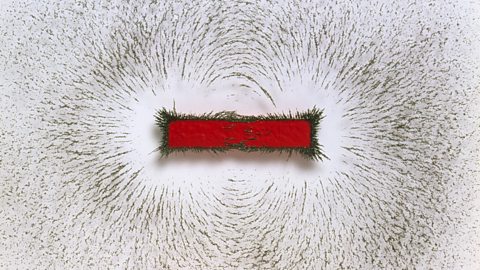Magnetic field of a bar magnet
Properties of magnets
Bar magnets are permanent magnetAn object that produces a magnetic field which pulls on other magnetic materials and attracts or repels other objects..
This means that their magnetism is there all the time and cannot be turned on or off as it can with an electromagnet.
Bar magnets have two poleEither of the two points of a magnet to and from which the lines of magnetic force are directed.:
- north pole – normally shown as N
- south pole – normally shown as S
Opposite (unlike) poles attract, and like poles repel.
If permanent magnets are repeatedly knocked, the strength of their magnetic fieldAn area around a magnetic material or the moving electric charge through which the force of magnetism acts. is reduced.
Converting a magnet to a non-magnet is called demagnetisation.
Magnets are made from magnetic metals – iron, nickel and cobalt.
These are the only pure metals that can be turned into a magnet.
Steel is an alloyAn alloy is a mixture of two or more elements, at least one of which is a metal. of iron and so can also be made into a magnet.
If these metals have not been turned into a permanent magnet they will still be attracted to a magnet if placed within a magnetic field.
In this situation they act as a magnet - but only whilst in the magnetic field.
This is called induced magnetism.
Substances that can be permanently magnetised are described as magnetically hard.
These are often alloys of iron, nickel and cobalt.
Substances that can only be temporarily magnetised are described as magnetically soft. Iron is magnetically soft – it can be easily magnetised and demagnetised.
Testing magnets
You can only show that an object is a magnet if it repels another magnet.
Magnetic fields
A magnetic field is the region around a magnet where a force acts on another magnet or on a magnetic material.
Magnetic field lines
Magnetic fields lines are invisible but they fill the space around a magnet where the magnetic forces work on magnetic materials, and where they can attract or repel other magnets.
Finding magnetic fields

Although we cannot see magnetic fields, we can detect them using iron filings. The tiny pieces of iron line up in a magnetic field.